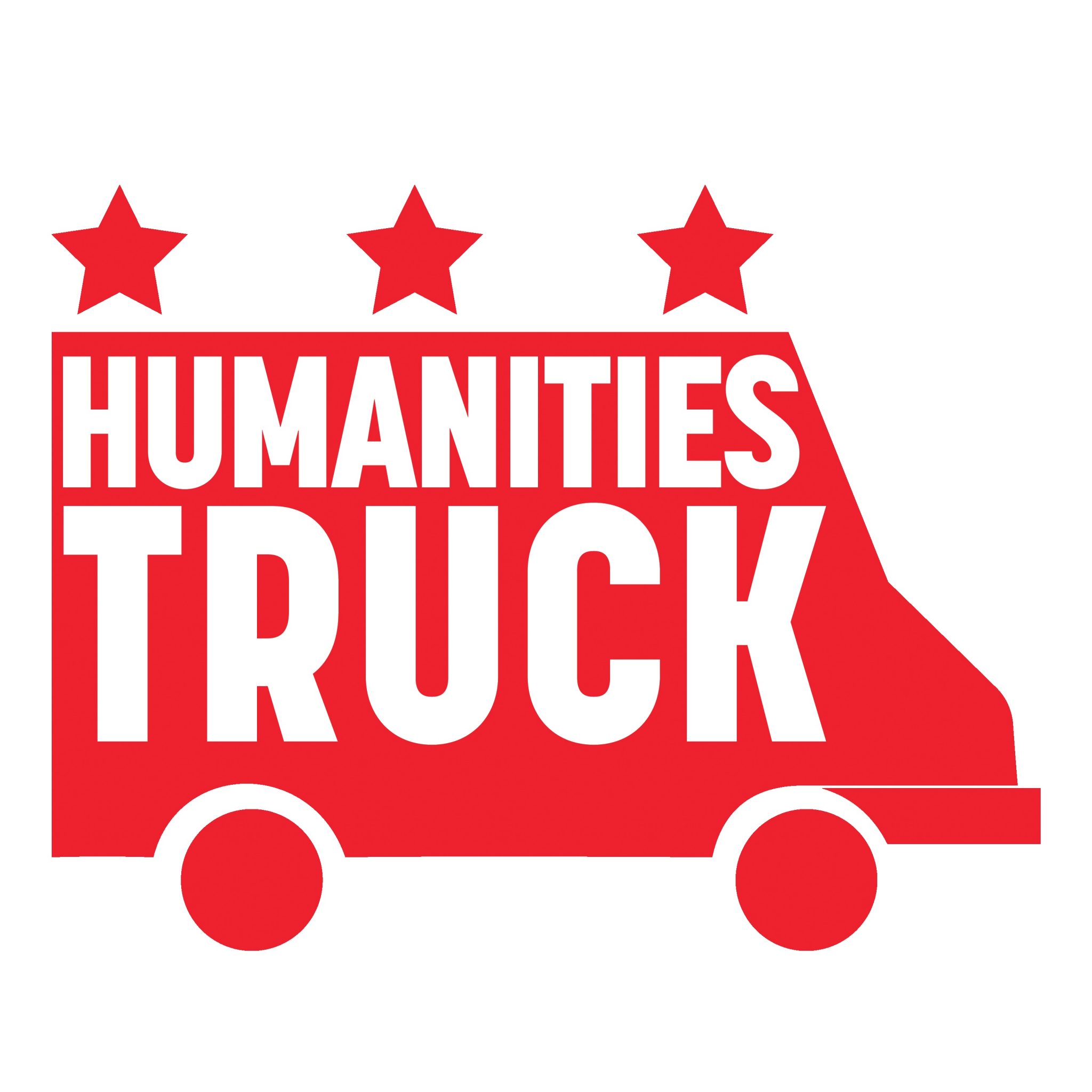Overview
The Humanities Truck is an interdisciplinary platform designed to facilitate collaborative community-based research, scholarship, and exhibitions. These collaborations take time and can take many different forms. The Humanities Truck Project Fellowship program provides a year for the Truck Fellows to be able to use the truck to develop these community relationships. Truck Fellows are expected to build a collaborative process that involves community partners in each phase of their projects, from research and documentation, to interpretation, and scholarly creation in the form of accessible exhibitions and performances. Throughout the year, Truck Fellows meet together to reflect upon the effective practices of community-engaged scholarship, and also to share the findings of their own projects.
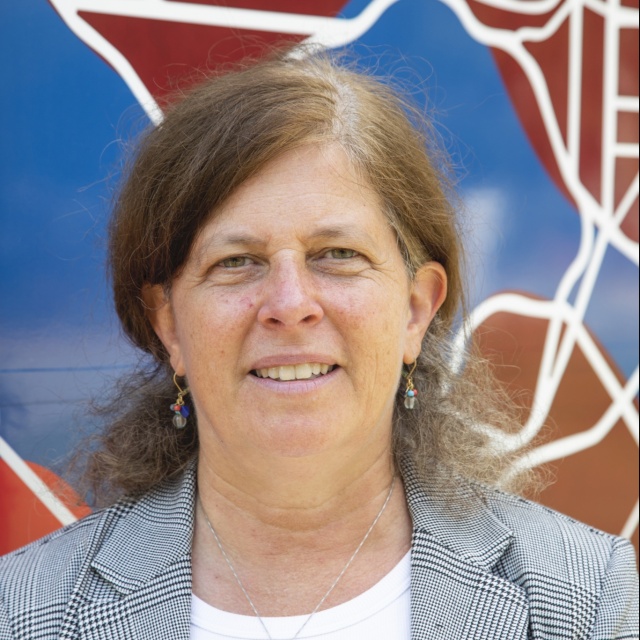
Mary Ellen Curtin
Mary Ellen Curtin has a Ph.d from Duke University and is a historian of modern African American and women’s social and political history. Her first book Black Prisoners and Their World documented the experiences of black convict laborers in the South after emancipation. Her next book on the life of Barbara Jordan, the first first black woman from the South elected to Congress, will be published with the University of Pennsylvania Press. Her review article on recent books in prison history will appear in the upcoming edition of the journal Labor and she also has an article in a new anthology entitled The Problem of Punishment. She worked as a consultant, and was interviewed for, the upcoming (Spring 2012) PBS documentary Slavery by Another Name, a history of African Americans and forced labor in the South.
Taking the Truck OUT!: Recording Lesbian Activism in the AIDS Crisis
This project begins to take on the unique challenge of researching, preserving, interpreting, and presenting to the general public the history of lesbian women’s leadership and activism during the HIV/AIDS crisis in Washington DC. Today, treating HIV/AIDS patients is viewed primarily as a medical issue that can be solved by science. But during the 1980s and 90s, activists insisted that the HIV/AIDS epidemic represented a political crisis and a lack of moral leadership. Lesbian activists converged on Washington DC, and joined with local residents and emerging public health organizations, such as Whitman Walker, to fight for the rights of AIDS patients and gay and lesbian communities. Decades later, the work of these activists to stand up to censorship laws and public scorn to fight for the lives of AIDS patients and those vulnerable to infection has receded from view. Contemporary audiences remain largely unfamiliar with the AIDS crisis, ignorant of lesbian history, and unaware of the discrimination faced by LGBTQ activists. This project brings together scholars, public historians, and activists to collaborate on recuperating and documenting the history of lesbian activist organizations in DC.
DC Low Wage Workers and Latino Immigrants: Histories That Matter
The immigrant community in DC in general and the day laborers and Afro-Latinos in particular, unlike other groups, stand in plain sight, yet they continue to be invisible even as they embody the nowadays popular stereotype of an undesirable immigrant who, among other things, comes from Mexico, is undocumented, “steal our jobs”, and will unlikely assimilate into US society. Trabajadores Unidos de Washington, DC (TUWDC) has provided much needed respite for the day laborers through various programs intended to improve their everyday lives. The day laborer community is a key participant in the economic, social, political and cultural life of DC. As such, with the Humanities Truck, we intend to document “hard to count populations” (by the Census Bureau) specifically, day laborer and Afro-Latino immigrant lives. These communities are missing out on the benefits of policies, representation, investments and services—health, education, housing—associated with being counted; their living conditions and specific needs are often not known; the potential contributions are mostly ignored. By conducting research (archival and current), making short documentaries that trace the lives of day laborers and Afro-Latinos in DC, and itinerant exhibits and drop in the Truck interviews, these populations will have well deserved visibility amongst themselves and extended community. Also, this year, we will create the Teatro Jornalero/Day Laborer Theater, similar to the Teatro campesino popularized in the late 1960s by Luis Valdez. There is a lot of misinformation regarding rights and duties of the day laborers, the latest migration laws, housing, wage theft, or medical care. Having the Truck as a platform, the Teatro Jornalero presents a valuable opportunity to reach sometimes hard to reach audiences.
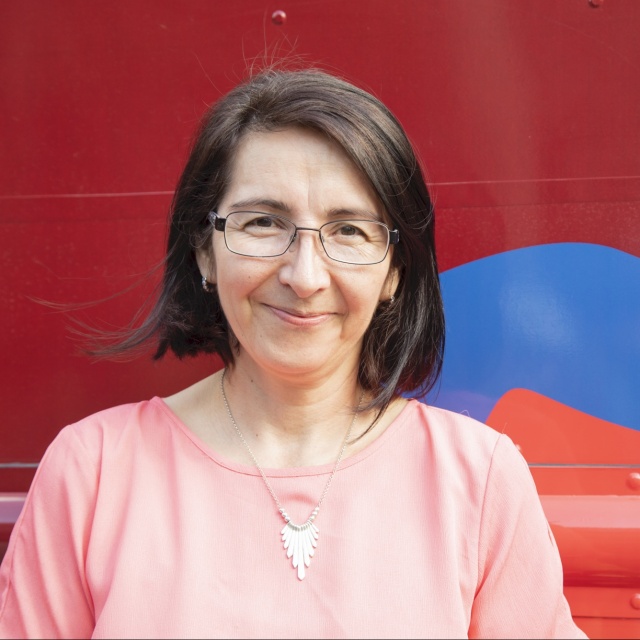
Ludy Grandas
Ludy Grandas is a senior professorial lecturer at the Department of World Languages and Cultures. Her teaching focuses primarily on nation and state formation in Latin America, Studies of Culture in Latin America, the Studies of Culture in Hispanic populations in the US, as well as Spanish Language. Her research interests include labor, immigrant labor, cultural studies as practiced in Latin America. For the last few years she has been collaborating with Trabajadores Unidos de Washington, DC, a non-profit organization whose mission is to empower day laborers, low income workers as well as immigrant workers in DC. She has led two Community Based Learning Courses which connect AU students to these specific populations.
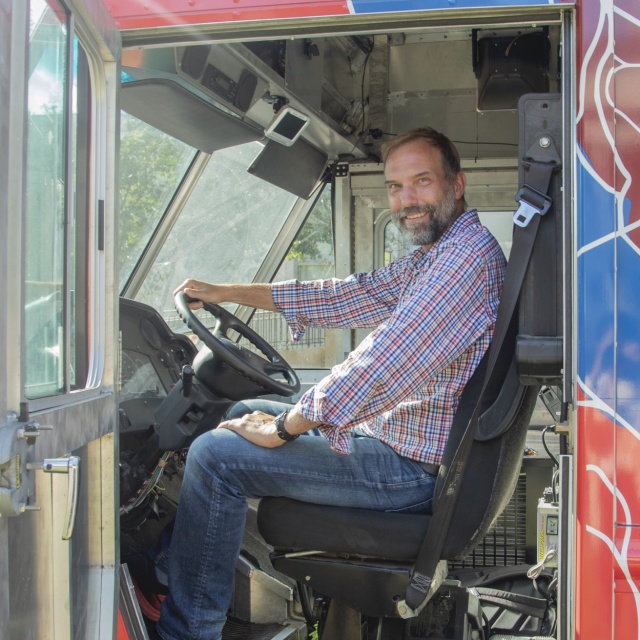
Dan Kerr
When he dreamed of being a truck driver as a child, Kerr never envisioned himself driving the Humanities Truck. But who knew how much fun that could be? Working alongside other visionaries at American University, Kerr, an associate professor of history at AU, spearheaded and now directs the Humanities Truck Project. He is an active community and oral historian committed to the democratization of knowledge production. Since his earliest work with the Cleveland Homeless History Project, he has sought out ways to bring the oral histories he has collected back to the communities they originated from. Through community workshops, participants in his projects have collectively reflected upon and interpreted the gathered stories. He is currently working on a project to document the past, present, and future of the Federal City Shelter in Washington, DC.
Whose Downtown? The Past and Future of the Federal City Shelter
Sitting two blocks from the Capitol building, sits one of the nation’s largest homeless shelters, which houses up to 1300 people a night in a World War II era building that was originally constructed by the federal government as part of an alley dwelling clearance policy. The shelter, as well as the building that houses it, have long and storied histories that are intertwined with national urban renewal and homeless assistance polices. Proposals, however, are calling for the demolition of the building for private redevelopment in 2021. The Whose Downtown? project will bring the truck to the shelter, document the experiences of the residents, share these experiences with other residents, and use the truck space as a workshop to reflect on the past and future of the shelter so that the residents can engage more effectively with the planning processes that will dramatically impact their lives. This project will continue through the duration of the grant and will document what could potentially be the last years in this iconic shelter’s existence.
Before the Flood: Using Drawing, Mapping, and Design Fiction to Imagine an Equitable Response to Climate Change
This project examines the city’s relationship with the river, and imagines what the city should look like in the future, in the face of rising seas and a climate in crisis. Too often, public process offers a no-build option, under which nothing new will arrive. In the current emergency, there is no no-build option. We’ll use the Humanities Truck as a participatory, mobile design workshop, bringing visual tools to residents so that they can explore landscape changes in the past, share their own experiences with the city’s built environment, and to test future possibilities for how the city can respond. The project focuses on waterfronts, streams, and streets. We see the city and its waterways as a palimsest, built of layers reaching back to before European settlement; the truck’s exhibits and programs will themselves be a palimsest of personal visions, current data, and historical maps and images.

David Ramos
David Ramos is a designer, developer, and design educator based in Washington, D.C. He teaches in the graphic design program at American University and co-organizes Knowledge Commons DC. His research and creative practice looks at using products of design—maps, interactive systems, images, and in-person events—to help us imagine landscapes past, present, and future. David holds an MFA from the Rhode Island School of Design.
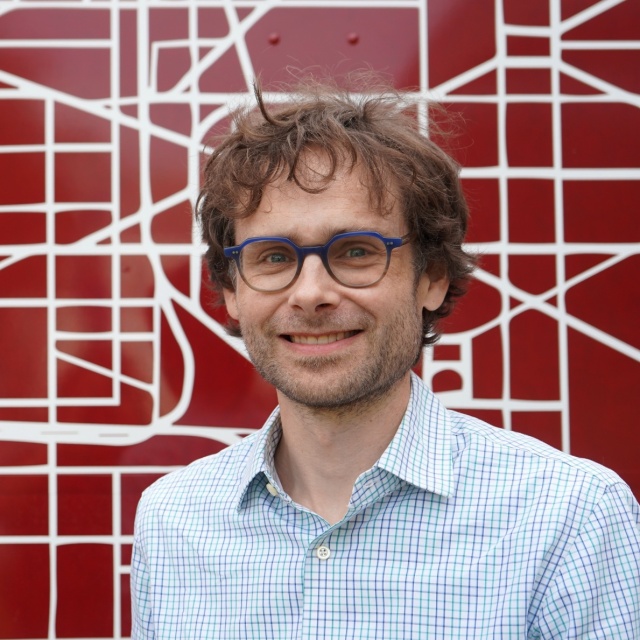
Benjamin Stokes
Benjamin Stokes is a civic media scholar and designer at American University with the Game Lab and in the School of Communication (SOC). His designs for cities have introduced neighbors through play, and retold local history with rebuilt payphones. Previously, Benjamin co-founded Games for Change, the movement hub for advancing social change with games. Benjamin’s publications include research on participatory design, neighborhood storytelling, and urban mapping by bicycle.
Learn more about Benjamin from his website and follow @bgstokes.
Two Interactive Listening Pilots
This project investigates how the truck can be part of a “storytelling system” for neighborhoods, including to bring museum content to the streets. We feature stories from the Smithsonian Anacostia Community Museum (ACM), and its anniversary exhibit “A Right to The City.” We connect the truck to residents’ cell phones, paper maps, and even custom phone booths to record new stories. We are investigating how strong neighborhoods can tell their own stories by connecting platforms, especially physical to digital. In partnership with the DC Public Library and with funding from the ACM, the truck will anchor a series of activities and events around the city, each tied to neighborhood history and identity.
Community Voice Project Collaborative Film Initiative
The Community Voice Project (CVP) will be using the Humanities Truck to run a community engagement project to take the 2019 CVP Film Series to non-profits across the city. Our goal is to host a least 3 public events in which we exhibit our short film series in an outdoor setting using the truck’s mobile projection system. We will host talkbacks after each screening with stakeholders from each community, as well as the storytellers from the film, to get feedback on viewer responses to the films. The aim is to honor each specific community and to promote critical dialogue among these DC storytellers, their communities, and our students, arriving at a community interpretation of what these stories mean on a collective level.
The CVP team will also be commencing production on a collaborative documentary centered on the newsroom at Street Sense Media, following a group of journalist filmmakers who have experienced homelessness as they report on the issue of DC’s Tent City. The Street Sense filmmakers co-op will collaborate with our AU film team to tell the story of one of America’s most unique newsrooms, reflecting the myriad perspectives on homelessness from reporters who know homelessness first hand. The Humanities Truck will be used as a mobile review system throughout the editing process, allowing our team to show unfinished cuts of the film to the people represented in the film for feedback.
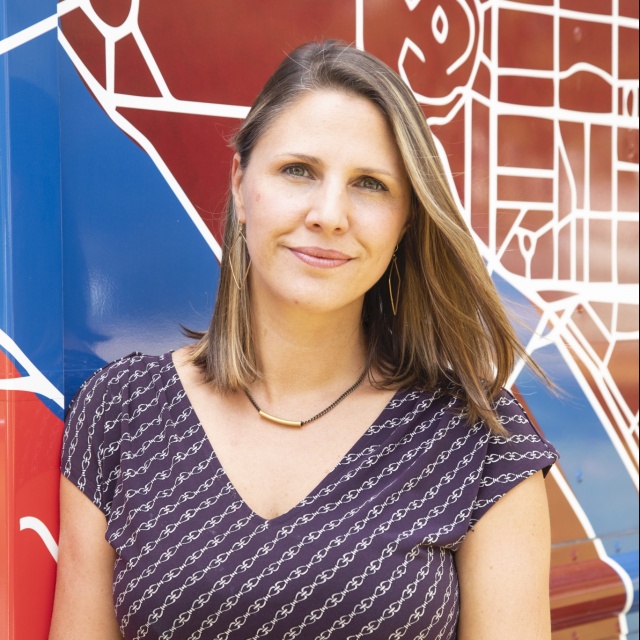
Laura Waters Hinson
Laura Waters Hinson is an award-winning filmmaker and Assistant Professor in the Film and Media Arts Division of the School of Communication. Laura serves as the division’s social impact coordinator and director of the Community Voice Project. Her first feature documentary, As We Forgive, about Rwanda’s reconciliation movement, won the 2008 student Academy Award for best documentary, the Cinema for Peace Award in Berlin, and was broadcast nationally on public television. Since 2009, Laura’s films have been screened at the U.S. Congress, the United Nations, the Smithsonian National Gallery of Art and at dozens of international film festivals such as the Santa Barbara International Film Fest, Austin Film Fest, Seattle Human Rights Film Fest, Manchester International Film Fest, among many others. Her latest documentary, Mama Rwanda, is about the new generation of women entrepreneurs in Rwanda transforming their nation after genocide and was supported by the National Geographic All Roads Film Project. She partnered with the Akilah Institute for Women, using the film to promote women’s education in East Africa and beyond. Laura is passionate about stories of hope coming out of seemingly hopeless places, and her work is dedicated to giving voice to those not often heard. Most recently, Laura directed her first narrative short called Moving Violation, which starred Milana Vayntrub and won Best Narrative Short at the DC Independent Film Festival. During the Spring of 2019, Laura served as the director’s shadow on the set of Showtime’s Homeland. Prior to this, she spent SY 2019/2019 as a Filmmaker-in-Residence within SOC where she re-launched the Community Voice Project (CVP), which partners American University student filmmakers with DC-based non-profits to produce a short film series capturing voices of marginalized community residents.
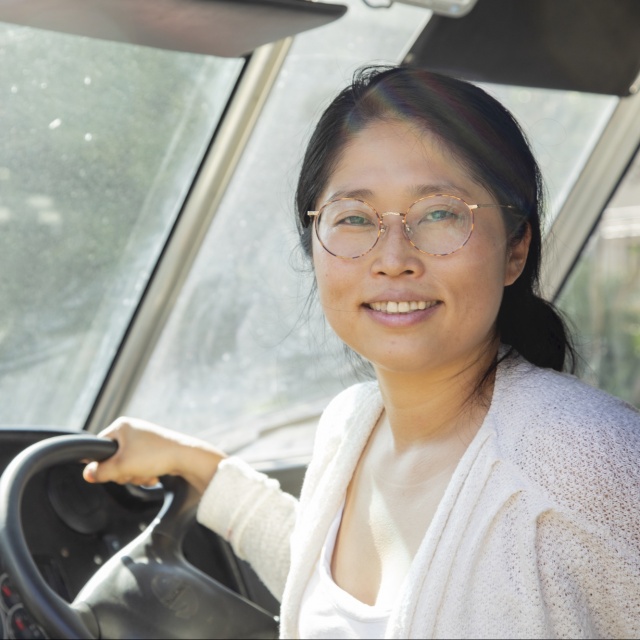
Naoko Wowsugi
Naoko Wowsugi is a community-engaged artist of Korean-Japanese descent. Using combined practices of visual art, local research, and community participation, Wowsugi’s projects highlight and fortify everyday communal and interpersonal identities.
Group Portrait Journey in DC
With the current political climate, there is a strong need to showcase our connection with people of all kinds, rather than what separates us. Group Portrait Journey in D.C. is a series of group portraits that will visually trace the intersectional nature of personal identity and our intangible connections as one large community in Washington, DC.
The goal of the project is to document a series of social groups in formal portraits over the course of a year that will visually show how, through one individual, diverse groups within the city are connected to one another. In the process, the project will explore what we mean by the word “group” and invite participants to elaborate on their own notions of belonging—and perhaps surprise viewers by showing how many social roles one person can occupy. The project is part documentary, part archive, part participatory, and part community art.

